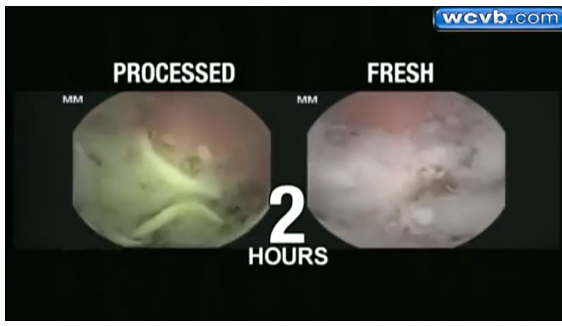Even after two hours, your stomach cannot break down highly processed noodles, interrupting normal digestion. Ramen is preserved with Tertiary-butyl hydroquinone (TBHQ), a hard to digest petroleum-based product also found in lacquers and pesticide products.
The Japanese certainly eat a lot of ramen. Ramen noodles aren’t necessarily bad for you or harmful, but they also aren’t very nutritious. If you are a big fan of ramen noodles, it is recommended that you mix in some protein and vegetables to make it a complete meal.
Kuo was able to show that, after two hours when the fresh noodles were long gone, the ramen noodles were still almost entirely intact in the intestines. While it’s not clear what, if any, downside there is to the findings, the results are startling.
Homemade ramen digest faster because they contain fewer preservatives, making them easier for the body to digest, while so-called instant ramen is full of preservatives, which leads to them lying around in your stomach for significantly longer.
How long does it take for ramen noodles to digest?
Advertising. After two hours, fresh noodles were almost completely digested, the stomach broke down the noodles as it should. Looking at the instant ramen noodles after two hours showed that they were much less broken down, and almost fully intact. Dr.
Sodium: One package of instant ramen has 1,875 milligrams of sodium, significantly more than the recommended daily intake of 1500 milligrams!
The main preservative in Ramen Instant Noodles is Terriary-butyl hydroquinone (TBHQ). TBHQ is an additive commonly used in cheap processed foods, such as microwave popcorn, wheat thins, and poptarts. The FDA says that TBHQ must not exceed 0.02 percent of its oil and fat content.
Propylene Glycol: a liquid alcohol used to preserve the texture of instant ramen. It’s also used in some tobacco products and… Antifreeze.
Instant Ramen noodles are cheap, quick, and easy to make. What you don’t know is that they are also potentially harmful to your digestive health .
What is the preservative in chicken ramen?
A preservative called TBHQ, which is found in many processed foods including Reese’s and Chicken McNuggets, extends shelf life of fatty foods and makes them harder to digest. It’s one of the many ingredients in Maruchan Chicken Ramen.
Dr. Frank B. Hu, a professor of nutrition and epidemiology at Harvard, told The New York Times, “Once or twice a month is not a problem , but a few times a week really is.”.
The results? “Women who consume instant noodles frequently were found to be more likely to have metabolic syndrome – the group of risk factors, including obesity and high blood pressure, cholesterol, and blood sugar, that increase the risk of heart disease and diabetes.”.
Yes, you know that instant ramen isn’t good for you, but studies have confirmed just how harmful the prepack aged food can really be. A study in the Journal of Nutrition links instant noodle consumption with heart risk, particularly in women.
Part of the study reads, “Women – though not men – who ate instant noodles at least twice a week showed a 68 percent higher risk of metabolic syndrome,” which is a syndrome that can increase the risk of heart attacks and strokes.
How long do ramen noodles last?
Even after two hours, they are remarkably intact, much more so than homemade ramen noodles, which were used as a comparison. This is concerning for a number of reasons. Ramen noodles contain a preservative called tertiary-butyl hydroquinone (TBHQ), which extends their shelf life by quite some time.
Ramen noodles are a go-to college food. They’re inexpensive, easy to make, and filling. No one has ever claimed they are healthy, but no one really knew the details of what happens once you swallow the budget-friendly meal …until now!
How long do ramen noodles stay in your stomach?
In the video above you can see how ramen noodles look inside a stomach two hours after they are consumed. Even at that phase noodles remain whole, which is not the case of homemade ramen noodles. This is horrifying in so many aspects.
About 68% of women who prefer eating instant noodles more than two times a week were at a higher risk of developing metabolic syndrome, which includes a great number of symptoms, such as central obesity, hypertension, high blood sugar, elevated triglycerides, and low HDL cholesterol levels.
Remove processed foods from your diet, and that requires an advance planning of your meals. But, when done step by step, this is not that complex. First, visit your local markets and look for in-season foods that are priced to sell. Then, plan your meals. The same applies to supermarket sales.
If you believe that instant noodles are not as bad as other kinds of fast food, such as burgers, fries, and burritos, make sure you read this article, and you will sure see things from …
An earlier research based on the nutrient intake between people who eat instant noodles and people who do not eat these noodles proved that instant noodles have almost no contribution to healthy diet.
Reproductive effect at high doses. Instant noodles and metabolic syndrome. The Journal of Nutrition published a study according to which women who eat nood les have a dangerously high risk of metabolic syndrome, which is not the case of women who do not eat that much noodles, regardless of their dietary habits or physical activity. ( 6)
In cases when food remains for too long in the stomach, it has a huge affect on the absorption of nutrients. Speaking of processed ramen noodles, they have almost no nutrients that should be absorbed, contain plenty of additives, including the preservative tertiary-butyl hydroquinone (TBHQ), better known as a toxin.

